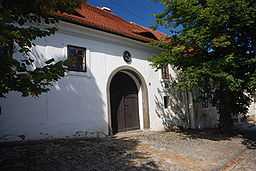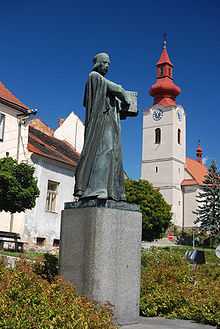Husinec (Prachatice District)
- See other places named Husinec (disambiguation).
| Husinec | |||
| Town | |||
 Jan Hus home | |||
|
|||
| Country | Czech Republic | ||
|---|---|---|---|
| Region | South Bohemian | ||
| District | Prachatice | ||
| Commune | Prachatice | ||
| Elevation | 504 m (1,654 ft) | ||
| Coordinates | 49°3′11″N 13°59′6″E / 49.05306°N 13.98500°ECoordinates: 49°3′11″N 13°59′6″E / 49.05306°N 13.98500°E | ||
| Area | 10.34 km2 (3.99 sq mi) | ||
| Population | 1,374 (2011-12-31) | ||
| Density | 133 / km2 (344 / sq mi) | ||
| First mentioned | 1291 | ||
| Mayor | Ludvík Friedberger | ||
| Timezone | CET (UTC+1) | ||
| - summer (DST) | CEST (UTC+2) | ||
| Postal code | 384 21 | ||
  Location in the Czech Republic
| |||
| Wikimedia Commons: Husinec | |||
| Statistics: statnisprava.cz | |||
| Website: www.husinec.cz | |||
Husinec (German: Husinetz) is a town in the South Bohemian Region of the Czech Republic. It has around 1,350 inhabitants. It is said to be the birthplace of Czech philosopher, reformer Jan Hus.
History

In 942, subjects of the Fürsten of Boleslaus I, Duke of Bohemia explored the area of Husinec for gold. The first written record dates from 1291 when Heinrich Vok von Borek und Husinec (Jindřich Vok z Borku a Husince) declared his rights to the area at the District Court. In 1359, the village became a city.
In the 14th Century a castle was built whose ruins exist today. In 1390, the Hus Castle was taken by Sigismund von Huller und Orlik (Sigmund Huller z Orlíka), a supporter of King Wenceslaus and eventually state treasurer and King's advisor. Caught falsifying documents, however, he was beheaded. The castle was left for his brother Andreas, who a short time later sold it to the Knights of Mikuláš of Hus. This castle, in 1419, hosted a meeting of Mikuláš's supporters who were preparing for the overthrow of King Wenceslaus. The coup did not take place. In 1420, Mikuláš fell off his horse and died.
The abandoned castle was taken and plundered by the robber baron Habart z Hrádku, or Lopata z Budějovic, known as "The merchant of the Golden Trail". On September 8, 1441, landowners from surrounding towns joined together to attack and burn the castle. In 1455, the Knight Smílek ze Lnář sold his allegiance to Ulrich II of Rosenberg bringing Husinec under the rule of Winterberg.
The economy of Husinec was dependent up the trade produced by the Golden Trail trade route. Goods transported on the route included, primarily, salt, expensive clothes, wine, seafood, tropical fruits, spices, iron and weapons.
In 1601, the House of Kolowrat bought the town followed by Hans Ulrich von Eggenberg in 1630. After the Battle of White Mountain many residents of Husinec, who were followers of the reformer Jan Hus and his teachings, emigrated abroad.
From 1655 to 1848 Husinec fell under the control of the House of Schwarzenberg. At that time the village contained about 1173 inhabitants but the population increased to 1731 in 1886, 1189 in 1931 and 1800 in 1938. In 1945, Husinec was liberated by the U.S. Army. Since 12 April 2007 Husinec a city.
Landmarks
- Birthplace of the reformer Jan Hus (Czech cultural monument)
- Family home and studio of artist Josef Krejza
- Church of the collection of the Holy Cross
- Church of St. Cyril and Methodius
- Monuments of Saint Nepomuk and Jan Hus
Sons and daughters of the city
- Jan Hus (c. 1364-1376, † 1415), reformer
- Cyril Chramosta (born March 6, 1908; † 3 December 1990), painter
- Josef Krejsa (born March 14, 1896, † 21 April 1941), artist
- Václav Hraba (born 17 May 1938), graphic artist
- Václav Kuneš (born November 10, 1949), artist
External links
| Wikimedia Commons has media related to Husinec (Prachatice District). |
_vlajka.jpg)
_zank.gif)